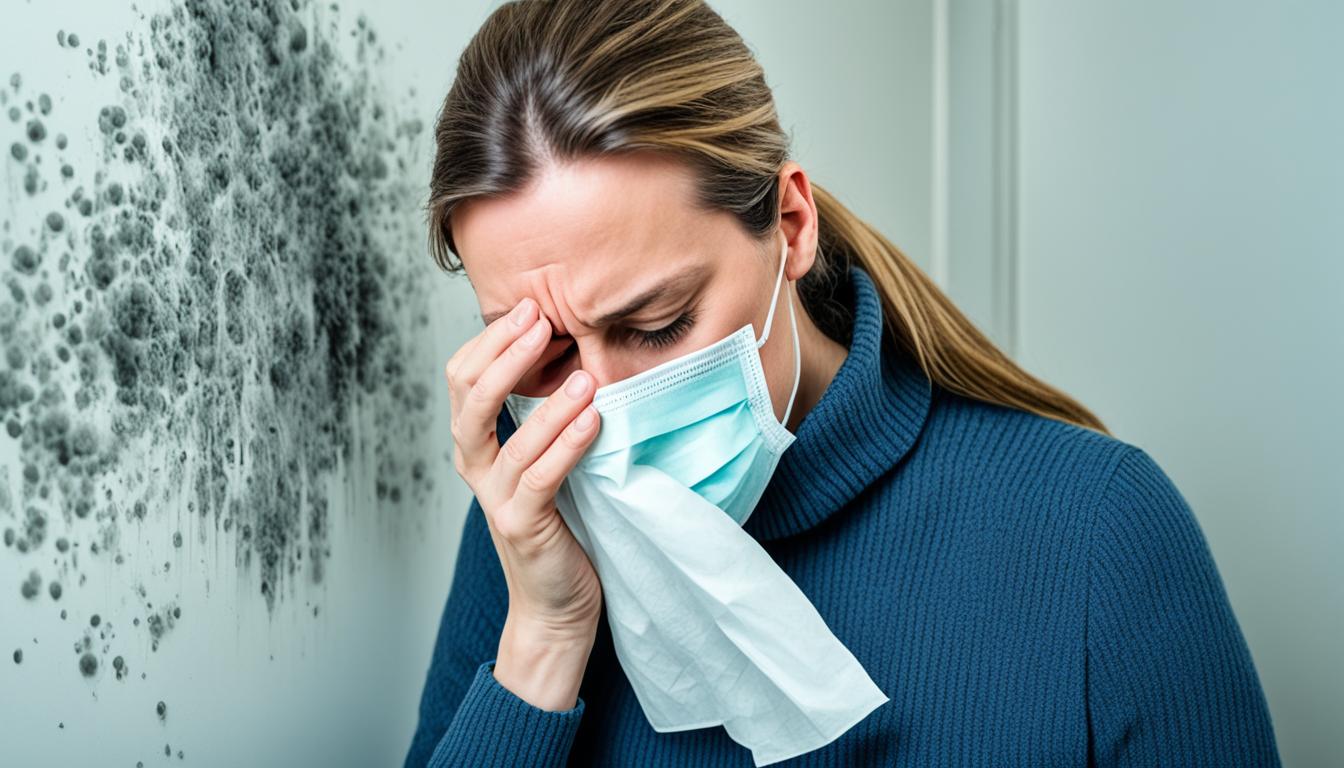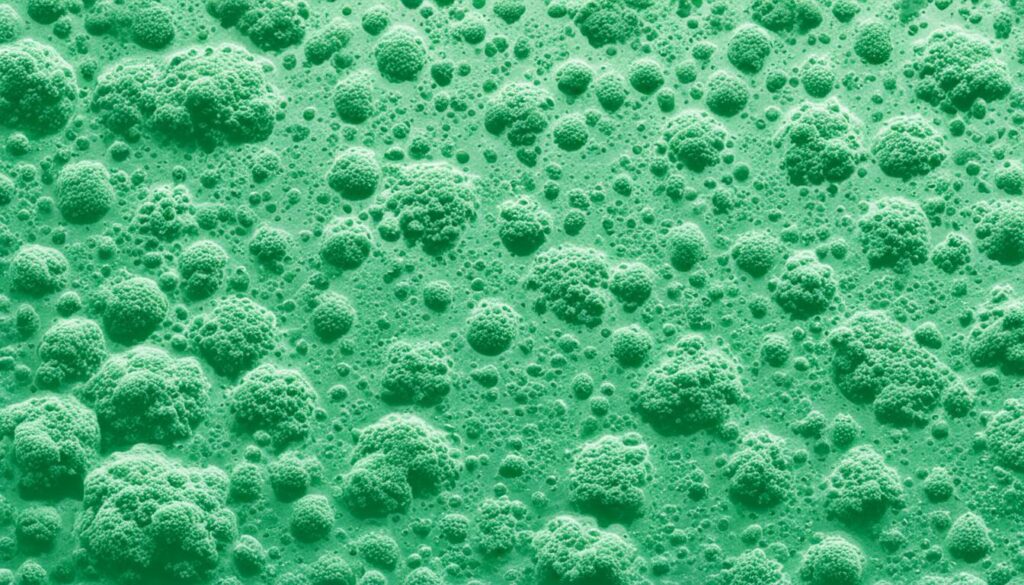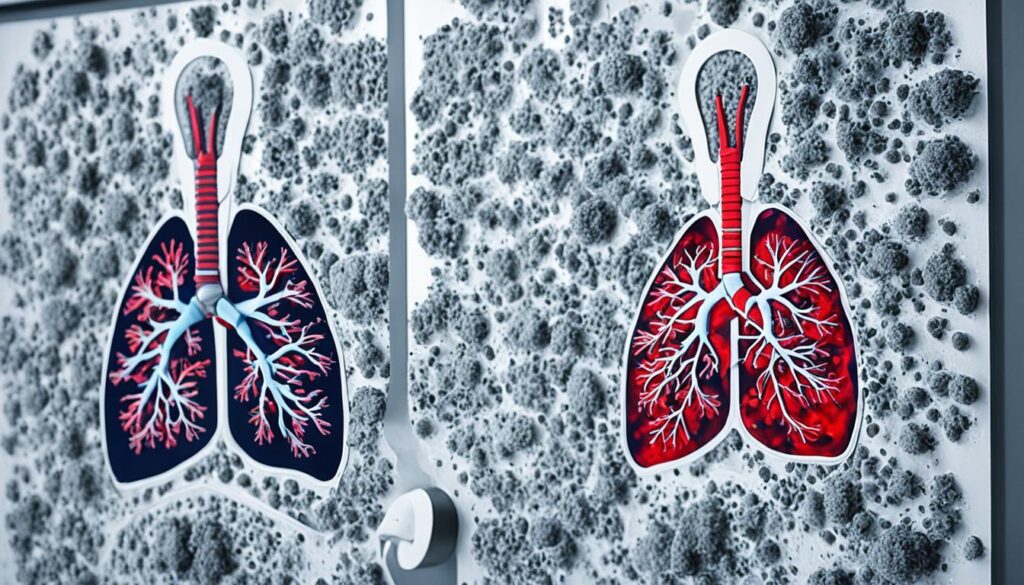
Signs of Mold Exposure – Spot the Health Risks
Mold exposure can have serious implications on your health, leading to a range of symptoms and risks. It is crucial to be aware of the signs that indicate mold exposure and take the necessary precautions to protect yourself and your loved ones. In this section, we will explore the various signs and symptoms of mold exposure, helping you understand the potential health risks involved.
Key Takeaways:
- Recognize the signs and symptoms of mold exposure
- Take appropriate steps to protect your health
- Understand the potential health risks associated with mold exposure
- Seek professional assistance if needed
- Maintain a healthy living environment to prevent further exposure
Understanding the Symptoms of Mold Exposure
When exposed to mold, individuals may experience a range of symptoms that can vary in intensity and affect different areas of the body. By recognizing these symptoms, you can quickly identify if mold exposure may be the cause of your health issues.
Respiratory System
Symptoms:
- Coughing
- Sneezing
- Wheezing
- Shortness of breath
- Nasal congestion
Skin
Symptoms:
- Rashes
- Irritated or itchy skin
- Hives
Eyes
Symptoms:
- Redness
- Watery or itchy eyes
- Blurry or reduced vision
Overall Well-being
Symptoms:
- Fatigue
- Headaches
- Dizziness
- Mood changes
- Difficulty concentrating
If you are experiencing any of these symptoms, especially when spending time in damp or moldy environments, it is essential to consider the possibility of mold exposure. Seeking medical attention and addressing the mold issue promptly can help alleviate your symptoms and prevent further health complications.

| Symptom | Frequency | Severity |
|---|---|---|
| Coughing | Frequent | Mild to Moderate |
| Sneezing | Frequent | Mild |
| Wheezing | Occasional | Moderate to Severe |
| Shortness of breath | Occasional | Moderate to Severe |
| Nasal congestion | Frequent | Mild |
| Rashes | Occasional | Mild to Moderate |
| Irritated or itchy skin | Frequent | Mild |
| Hives | Occasional | Mild to Moderate |
| Redness | Occasional | Mild |
| Watery or itchy eyes | Frequent | Mild |
| Blurry or reduced vision | Occasional | Mild |
| Fatigue | Frequent | Mild to Moderate |
| Headaches | Occasional | Mild to Moderate |
| Dizziness | Occasional | Mild to Moderate |
| Mood changes | Occasional | Mild |
| Difficulty concentrating | Occasional | Mild |
Health Risks Associated with Mold Exposure
Prolonged exposure to mold can pose significant health risks and lead to various complications. It is crucial to be aware of these risks to take necessary precautions and protect yourself and your loved ones. Here are some of the health risks commonly associated with mold exposure:
1. Respiratory Problems
Mold spores can trigger respiratory issues, especially in individuals with pre-existing conditions such as asthma or allergies. Breathing in mold spores can cause coughing, wheezing, shortness of breath, and even severe asthma attacks. Prolonged exposure may lead to chronic respiratory conditions.
2. Allergic Reactions
Mold exposure can cause allergic reactions in sensitive individuals. Common symptoms include sneezing, nasal congestion, runny nose, itchy eyes, and skin rashes. These allergic reactions can significantly impact the quality of life and overall well-being.
3. Infections
Certain types of mold, such as black mold (Stachybotrys chartarum), can produce mycotoxins that may lead to infections when inhaled or ingested. These infections can affect various parts of the body, including the respiratory system, skin, and internal organs.
4. Complications in Immunocompromised Individuals
Individuals with weakened immune systems, such as those undergoing chemotherapy or with HIV/AIDS, are more susceptible to the health risks associated with mold exposure. Mold spores can cause severe and potentially life-threatening infections in these individuals.
“The presence of mold can lead to a wide range of health problems, particularly in individuals with respiratory conditions or compromised immune systems.”
To better understand the potential health risks of mold exposure, refer to the table below:
| Health Risks | Symptoms |
|---|---|
| Respiratory Problems | Coughing, wheezing, shortness of breath |
| Allergic Reactions | Sneezing, nasal congestion, itchy eyes, skin rashes |
| Infections | Respiratory infections, skin infections |
| Complications in Immunocompromised Individuals | Severe infections, pneumonia, systemic illnesses |
It is essential to consult a professional mold remediation service, such as Fix Mold Miami, if you suspect mold growth in your home or workplace. Proper remediation can significantly reduce the health risks associated with mold exposure and ensure a safe living environment.

Conclusion
In conclusion, recognizing the signs and symptoms of mold exposure is crucial for safeguarding your health. By understanding the potential health risks associated with mold exposure, you can take appropriate action to prevent further exposure and seek professional assistance, such as a mold assessment from Fix Mold Miami.
Mold-related risks can pose significant health consequences, especially for individuals with compromised immune systems. By actively protecting yourself and your loved ones from mold exposure, you can create and maintain a healthy living environment.
Remember, prevention is key. Regularly monitor your surroundings for any signs of mold growth, such as musty odors or visible mold. Promptly address any water leaks or moisture issues, as these provide a favorable environment for mold to thrive. Additionally, ensure proper ventilation and humidity control in your home or workplace to minimize the risk of mold growth.
If you suspect mold exposure or experience persistent health issues that may be related to mold, consulting with a professional mold remediation company, like Fix Mold Miami, can provide the expertise and solutions needed to address the situation effectively. Prioritize your well-being and take proactive measures to mitigate the risks associated with mold exposure.




